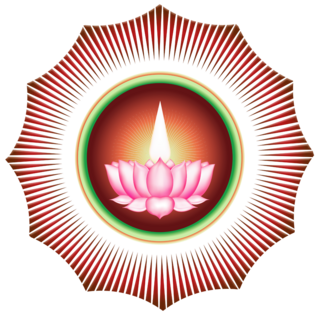
Ayya Vaikundar also known as Siva Narayana or Vaikunda Swami was the founder of the Ayyavazhi faith. The Ayyavazhis believe him to be the first and foremost Purna avatar of Eka-Paran and the god Vishnu (Narayana). As per Ayyavazhi mythology detailed in their scriptures, Ayya Vaikundar incarnated in 1833, when he rose from the sea of Tiruchendur in the mortal shell of Vaikundar.

Ayyavazhi is a Hindu denomination that originated in South India during the 19th century.

Akilathirattu Ammanai, also called Thiru Edu, is the main religious text of the Tamil belief system Ayyavazhi. The title is often abbreviated to Akilam or Akilathirattu.

Kroni is a figure in Ayyavazhi mythology. He is the primordial manifestation of evil, and manifests in various forms of evil, such as Ravana and Duryodhana, in different ages or yugas. To counteract and destroy the evil of Kroni's manifestations, Mayon incarnates as Avatars such as Rama and Krishna. He seems to be more evil than the demon Kali of the Mahabharata and Kalki Purana sharing similarities with Lucifer.

Ayyavazhi mythology is the mythology of the South Indian religious faith known as Ayyavazhi, which is officially considered a Hindu sect. The main source of Ayyavazhi mythology is the Ayyavazhi scripture, Akilathirattu Ammanai, and its supplement, Arul Nool. The Akilathirattu Ammanai is a recitation by Mayon to his consort Lakshmi. It is divided into three sections: Early Avatars, incarnational events and post-incarnational events.
According to Akilathirattu Ammanai the holy text of Ayyavazhi the present universe has eight aeons and we are in the seventh aeon, Kali Yukam.

The following outline is provided as an overview and topic guide to Ayyavazhi:

Ekam is the Sanskrit for "one, single, solitary", as a noun meaning "unity". In Ayyavazhi and Hinduism, it refers to a concept of monism akin to that of Brahman in Advaita philosophy and Smarta theology.

Ayyavazhi theology is the theology of a South Indian religious Faith and officially a sect of Hinduism known as Ayyavazhi. Several fundamental theological beliefs distinguish the Ayyavazhi tradition from Hinduism.

According to the Ayyavazhi religious sect of Hinduism, the Ayyavazhi Trinity is the incarnation of God in the current stage of world development. Lord Vaikundar, the Incarnation, is the combination of the Ultimate God, Trimurti and Narayana. In Akilam immediately after the Incarnation of Vaikundar, he was viewed simultaneously as the Ultimate God, Narayana, and as son of Narayana. As per the earlier deed Narayana had to destroy Kaliyan, but due to the boons that kaliyan claimed Narayana has destroy him in form of Pantaram. And as per the promise made by Kaliyan, he would only be destroyed, if he give torture to any Pantaram. To overcome all these, such a unique way of Incarnation was planned.

The Akilam one is the first among the seventeen parts of Akilathirattu Ammanai, the religious book of Ayyavazhi. This section includes the Kappu, the first part; it tells of the Detchanam, and describes the political and sociological situation in the early world.

Akilam four is the fourth section of Akilathirattu Ammanai, the primary scripture of Ayyavazhi. This section narrates the prosperous life of Santror after their marriage with the daughters of King Nirupathi. It also describes the birth of Kaliyan, his cruel activities and its impact in the world.

Akilam Five is the fifth section of Akilam, which is the primary scripture of Ayyavazhi. It narrates the cruel reign of Kaliyan, the death of two Santror and the subsequent curse given to Kali. It also hints about the start of the Kalineesan dynasty that tortured Vaikundar.

As Kalimayai captured the king of Thiruvitankur and began to rule over the people as their king, Thirumal came to Thiruvananthapuram according to Ayyavazhi mythology. This falls under Akilam five in Akilathirattu Ammanai.

The Ayyavazhi symbolism deals with the symbols which are used in or used to represent Ayyavazhi. Though Akilam the scripture of Ayyavazhi does not point out any symbol directly, there are a few symbols which are used for representing Ayyavazhi which came into practice gradually.

Akilam six is the sixth section of Akilam, the primary holy scripture of Ayyavazhi. This section describes the transformation of the ruling authority of the universe from Sivan to Thirumal.

The purpose of this chronology is to give a detailed account of Ayyavazhi from the beginning of the incarnational events of Vaikundar to the present time. Question marks on dates indicate approximate dates. A star (*) indicates the mentioning of that particular date in Akilam or Arul Nool. All dates but a few are found in the Tamil calendar and so doesn't coincide exactly with the months of the Gregorian calendar. The dates may span over any halves of the two consecutive months (Gregorian).

The Akilathirattu Ammanai the scripture of Ayyavazhi teaches Dharma on two different perspectives. One in sociology as charity and truth and another under spirituality to attain the stage of Oneness, unified into Lord Vaikundar. This state of ultimate oneness is called as Dharma Yukam or Dharma Pathi. Akilam also says that, Dharma is the only living wheel. The sociological way is asked to be followed by every one to attain the spiritual state of Dharma.

The ethics of Ayyavazhi are found scattered throughout the primary scripture, Akilathirattu Ammanai. They are also integrated with the meta-narrative mythography. However, regarding ethics, Arul Nool is considered as an accumulation and prophecy of the core concepts found in Akilathirattu. In Akilathirattu, the ethical abstracts are pointed out as "told by God" at several places at different situations to lesser god-heads, devas, saints etc. when asked by them.

Ayyavazhi beliefs are those associated with the South Indian religious faith known as Ayyavazhi. Some of the beliefs of Ayyavazhi are shared with that of Hinduism, and others are unique to Ayyavazhi.



